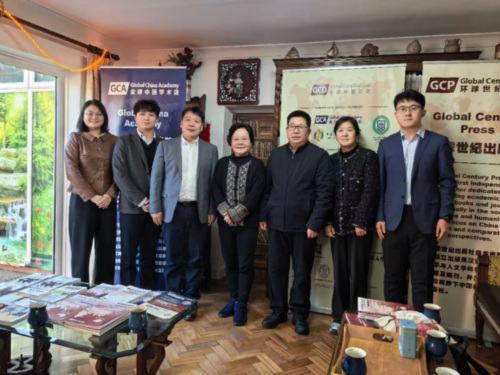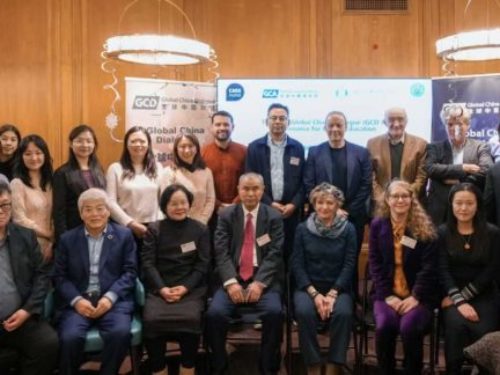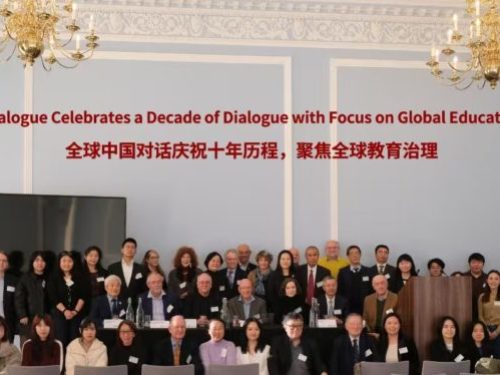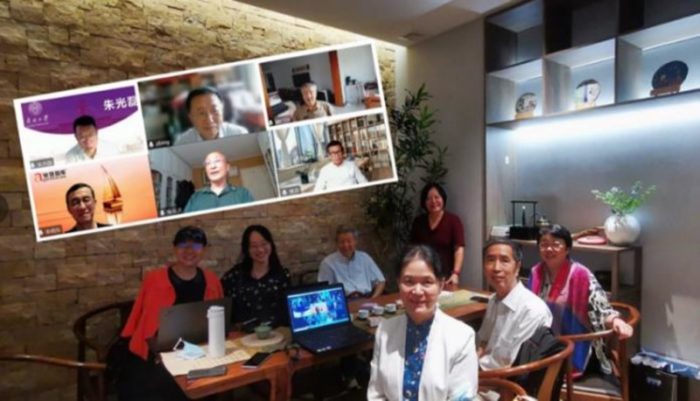

Introduction
On her trip to accompany her mother returning to China and to help her settle there, Professor Xiangqun Chang visited China from early September to mid-November 2022. During this period, she participated in a series of meetings and activities with related parties there. The description of the activities below aims to enable our global colleagues to meet some of our Chinese colleagues and contacts in China for the purpose of sharing information and networking.
Timeline
On the 17th September, a meeting was held in the Tsinghua Science and Technology Building at Tsinghua University, Beijing. It was organized by GCA Trustee Dr Yuan Cheng (front right), Country Manager of Greater China, Russell Reynolds Associates (UK), and Professor LAN Chun of Beijing Foreign Studies University, Executive Editor of the Journal of Chinese for Social Science (JCSS, front left). All the GCA Founding Fellows and Life Fellows participated in the meeting online and offline.
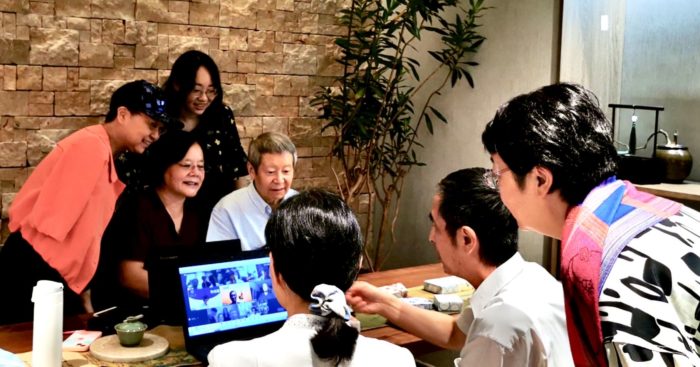
The above photo shows participants in person or online. In-person participants included Professor LI Qiang (rear 2nd right), Professor XIE Lizhong (front 2nd right) and Professor Xiangqun Chang (rear right). Online participants (inset) included Professor BING Zheng (top centre), Professor ZHU Guanglei (top left), Professor GU Yueguo (top right), Professor ZHANG Xiaodong (bottom left), Professor ZHANG Letian (bottom centre), former Dean of School of Social Development at Fudan University, former Chinese President of GGPN Global and Global China Institute (GCA’s predecessors) and Honorary Editor of JCACSS (Chinese edition); Dr Qing Cao (bottom right). Many important issues were discussed in the meeting.
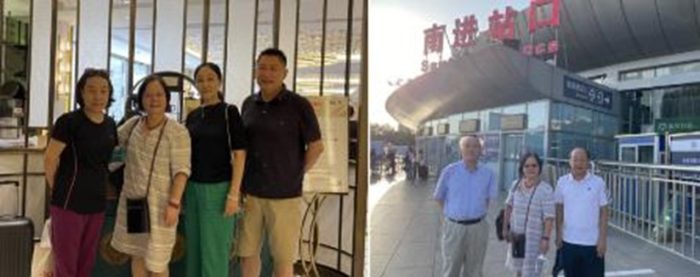
Left: In morning of the 18th September, Professor Chang met Ms ZHANG Haiou (left), former Editor-in-chief of the New World Press, one of GCP’s Chinese partners. The topic of metaverse was discussed.
Right: In the afternoon, Professor Chang had a productive meeting with Professor CHEN Guangjin (left), Director of Institute of Sociology, and Professor FANG Ning (right), Deputy Director of Institute of Political Science, Chinese Academy of Social Sciences (CASS).

On 19th September, Professor Chang visited the headquarters of Learning without Borders (LwB, also known as UVIC) in Changsha City, Hunan Province. UVIC funded the first three Global China Dialogues and has been one of the most faithful supporters of GCDs. In the meeting, Philip Hao (3rd left and far right in the above photos), CEO of the LwB and UVIC, and his colleagues discussed issues for further collaboration with GCA.

On 21st September, three meetings were held at Kingswell Hotel at Tongji University.
Left: The first meeting was with Professor WANG Xin (right) and Dr DING Fan (left). Professor Wang interviewed Professor Chang in London in 2018 when she was visiting fellow at University of Westminster and published the interviews in both English and Chinese. Wang is Head of Department of Communication, School of Arts and Media, Tongji University.
Centre: Meeting with Ms ZHANG Yanli (2nd left), General Secretary of the School, Professor WANG Jianmin (right), Deputy Dean of the School, and Dr DING Fan (left), Head of the Academic Development Division of the School. Ms Zhang showed some photos of the International Conference on Comparative Media Studies, jointly organized by the School and CCPN Global, on the occasion of the Centenary of Tongji University in 2017, when Professor Chang delivered greetings at the Opening session. She accepted the School’s invitation to give a speech at an international conference in person in mid-October.
Right: Meeting with Professor LI Linxue (3rd right), Dean of the School, Dr WANG Zhili (left) and others. Three meetings covered a total of 10 topics, including collaborations in organizing events, research projects, building a corpus for specific purposes and publications.
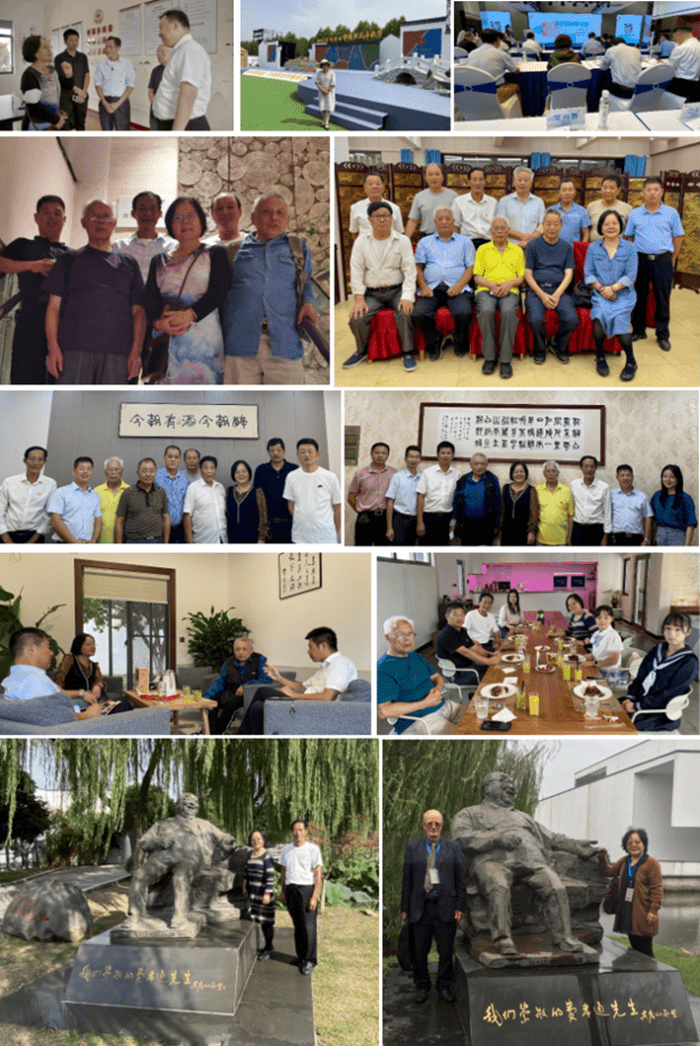
In the evening of 21st September, Professor Chang arrived in Kaixiangong Village, Qidu Township, Wujiang County, Suzhou City. The renowned Chinese anthropologist and sociologist Fei Xiaotong conducted his fieldwork in the village in 1936, which resulted in his book Peasant Life in China (1938). Based on her thorough fieldwork in the same village, Professor Chang published Guanxi or Li Shang Wanglai ?: Reciprocity, Social Support Networks, Social Creativity in a Chinese Village (in English and Chinese, 2010 and 2011). She has been developping the concept of ‘recipropriety’ and testing it in and outside China. Photos are numbered 1–10 from top to bottom, left to right. Photo 1: Profesor Chang talked to Mr CAI Jianzhong, the General Sectotaery of Qidu Township. Photo 2: Enjoying the Chinese Farmers’ Harvest Festival (CFHF) in the village, the first such festival created by the state. Photo 3: Participating in a Rural Development Forum during the CFHF. Photo 4: Meeting Professor LIU Haoxing, School of Social Development, Fudan University (front left), Dr HUI Haiming, Fomer Director of Policy Studies of Suzhou City (front right), ZHOU Yuguan (rear right), a non-party member who was officially designated ‘General Secretary’ of the village; YAO Fukun (rear centre), Head of both Fei Xiaotong Museum and the village’s Folk Museum and related affairs; XU Guoqi (rear left), former Deputy General Secretary of the village, currently a member of a Special Working Group (zhuanban 专班) that is in charge of major development projects of the village. Photo 5: Professor Liu (front centre) arranged a meeting with former heads of the village and some village groups. Photo 6: SHEN Zhirong (rear right, in black), former General Secretary of the village, who helped Professor Chang conduct her first fieldwork in the village in 1996. Photo 7: An official meeting arranged by the current General Secretary XIA Zhiyao (3rd left). Photo 8: A discussion about the ‘Special Working Group’ in its office in the village. Photo 9: Dining in Jiangchun Club (江村西餐厅), a Western-style canteen in the village. Photo 10: With YAO Fukun by the Fei Xiaotong statue. Photo 11: With Professor Stephan Feuchtwang, LSE, by Fei’s statue in 2016, when they participated in the international conference to mark the 80th anniversary of Fei Xiaotong’s fieldwork in the village.
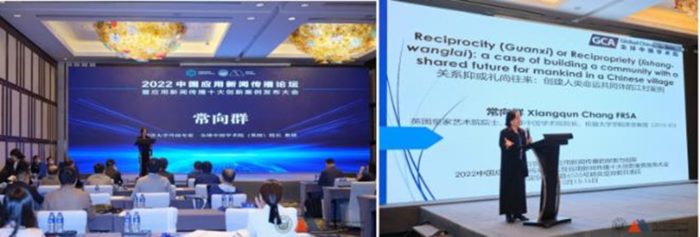
Based on the above fieldwork, on 15th October, Professor Chang delivered a speech entitled ‘Reciprocity (Guanxi) or recipropriety (lishang-wanglai): a case of building a community with a shared future for mankind in a Chinese village’, at the international conference ‘China and the World: Exploration and Innovation of Applied Journalism and Media Studies’, Tongji University, Shanghai.

On 16th–17th October, Professor Chang visited Suzhou City, the ‘Heaven City’ in China. She had an enjoyable visit to a Cantonese tea house, Chaoren Fang, which mixed different styles of Chinese calligraphy including ‘kung fu calligraphy’, a kind of performative art, accompanied by Dr HUI Haiming (right). The owner, Mr WANG Kai (2nd right), believed this is a good way to communicate with people from different cultural backgrounds. They also walked in underdeveloped original residential places in Ming Dynasty in Suzhou City. One wonders if Heaven City can get any better!

On 18th–21st October, Professor Chang visited Wuxi City, a historic city over 3,200 years old, with its Grand Canal. A UNESCO World Heritage site, it now has the highest per capita GDP in China.
The visit was arranged by Mr DU Yichao (3rd right in green, left photo, with his colleagues), PhD candidate in anthropology at University College London. He is also Director of Wuxi New Culture Research Institute.
Centre: Officials and experts from Liangxi District accompanied Professor Chang on visits to places of interest.
Right: For COVID tests and to obtain different codes, Professor Chang’s UK passport was checked everywhere throughout her visit to China. This one was in Wuxi, which was designated a zero-risk city at that time.
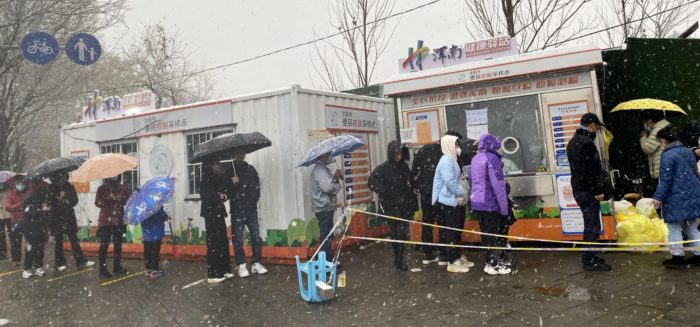
The photo on the left was taken on 12th November 2022 in Shenyang City, while Professor Chang was queueing for a COVID test or nucleic acid testing (核酸检测) on a snowy day. The term ‘doing nucleic acid tests’ (做核酸) has become a catchphrase in people’s daily lives, and the action of ‘doing nucleic acid tests’ has become a way of life in their everyday routines. The nucleic acid testing sites were well-built and well-located. Even a small site was easier to find than a well-known residential area (小区) on a digital map.
Professor Chang’s experiences and skills in learning and using different kinds of health codes became a special memory: from international health codes to provincial, regional, or city-specific ones, and from English to Chinese versions. For non-Chinese passport holders entering Beijing, the English version of the health code (Health Kit) is required. There were different names for health codes, such as Liaoshitong (辽事通) for Liaoning Province, Shengshitong (盛事通) for Shenyang City (Shengjing 盛京 was the capital of the Manchu state during the Qing Dynasty period, which later became the city of Shenyang), Suishenma (随申码) for Shanghai City (Shanghai known as ‘Hu沪,’ also referred to as ‘Shen 申’), Sukangma (苏康码) for Jiangsu Province, and Xikangma (锡康码) for Wuxi City. These codes were necessary for entry at airports and stations. Within any given location, whether it be a hospital, office, shop, restaurant, or any place of interest, the ‘Changsuoma’ (场所码) had to be presented. All the above codes must be dynamic and cannot be photos or screenshots of codes that were prepared earlier. The diversity and ingenuity of these health codes reflect the Chinese people’s adaptive strategies in dealing with COVID-19.
The above tests and codes have ensured that both the virus and people are tightly controlled. Everyone seems to have adapted to this kind of lifestyle. It is truly remarkable how the COVID-19 situation changed dramatically two weeks after she left China. ‘Understanding China and the World,’ one of GCP’s book series, is clearly important and will continue to be so.

